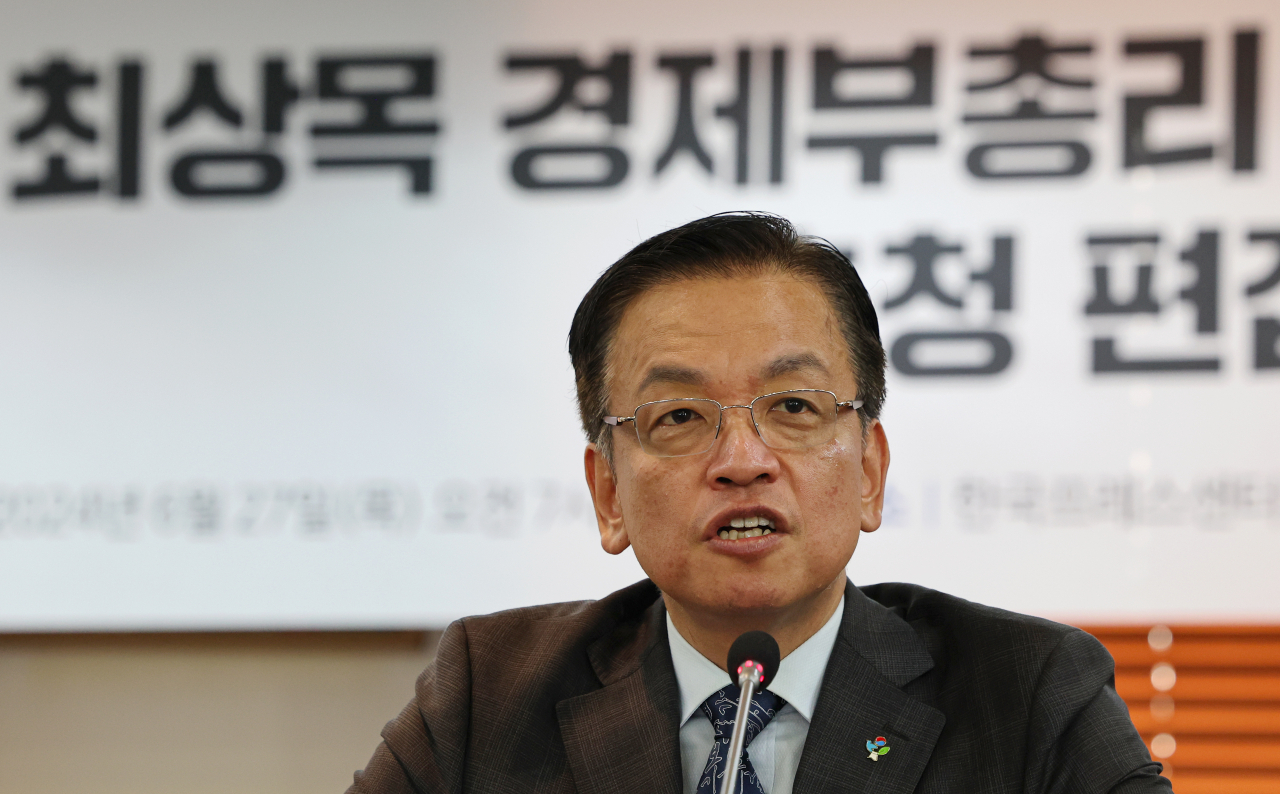Finance Minister indicates inheritance tax reform in July

Finance Minister Choi Sang-mok speaks at a a forum hosted by the Korea News Editors' Association in central Seoul, Thursday. (Yonhap)
The South Korean government is to revise the inheritance tax scheme that imposes up to a 50 percent tax for big companies here as part of the government’s tax code revision slated for late July, Finance Minister Choi Sang-mok said Thursday.
“I personally prioritize the inheritance tax reform, which requires more deliberation," Choi said when asked about the government's priority regarding tax reform at a forum hosted by the Korea News Editors' Association.
“The inheritance tax rate is of a high level here and the current measure, which has been in place more than around 20 years, has to be reasonably revised,” Choi said.
The country has a top inheritance tax rate of 50 percent in such a case that the value of inherited assets exceeds 3 billion won ($2.2 million), which is the second-highest level following Japan’s 55 percent among Organization for Economic Cooperation and Development member countries.
The average inheritance tax rate for OECD members stands at 15 percent, while countries such as Sweden, Norway, Austria, Canada and Australia have abolished the inheritance tax to boost the corporate environment.
Yet Korea’s inheritance tax bracket has remained the same for 24 years, with the exemption ceiling standing at 1 billion won since 1997.
While the inheritance tax scheme has remained the same over the years, the number of taxpayers to whom the inheritance tax applies has been on a sharp surge, rising from 10,181 in 2020 to 19,944 in 2023, partly due to the recent price hikes of real estate properties here.
The presidential office has been looking into bringing down the maximum inheritance tax rate from the current 50 percent to 30 percent. Another possible area of reform is Korea's “estate tax” system, which levies a tax on the total assets owned by a predecessor, instead of the “inheritance tax” system that imposes a tax on the divided inheritance.
"Considering the urgency and necessity of the tax reform, (the revision) will be included in the tax law amendments in July,” Choi said.
Meanwhile, six major business lobby groups here, including the Korea Chamber of Commerce and Industry and the Korea Enterprises Federation, called for the government to revise the related laws by releasing a booklet on the same day.
The booklet claims Korea's inheritance tax and gift tax system run counter to global standards, and that the burden from the taxes is among the highest in the world.
It accused the inheritance tax and gift tax of being an act of double taxation, as it imposes a tax on assets that have already been taxed by income tax or property tax.
Yet the government’s push to revise the inheritance tax law faces hurdles from the opposition. The government's reform plan for the tax was postponed last year due to heavy criticism.
The Democratic Party of Korea, with a majority of parliamentary seats here, has criticized the revision scheme as an act that would only benefit those born with a “silver spoon.”
At the event, Choi also mentioned the government’s “corporate value-up program,” which aims to boost the Korean stock market by pushing listed firms to enhance shareholder value.
“The corporate value-up program is a long-term directive. (The government) is considering providing tax incentives to participating companies for the time being,” Choi said, mentioning how the government could ease regulations on the corporate tax and income tax on dividends.
Since the nation's top financial regulator, the Financial Services Commission, released the value-up guidelines in February, there has been criticism that the directive lacks motivational drivers for companies to join the program.
"Securing competitiveness of market-listed companies is important to resolve the ‘Korea discount,’” Choi said, referring to the tendency of companies listed here to have lower market valuations than their global peers.
“We are looking into how the market could reflect the true value of companies, in comparison with global standards,” Choi said.
By Im Eun-byel (silverstar@heraldcorp.com)
EDITOR'S PICKS
- Woori Financial Group reveals progress in sustainable management
- Naver’s top executives discuss sovereign AI with Nvidia CEO
- SK hynix develops industry's top-spec SSD for AI PCs
- Hanwha Systems teams up with US satellite company
- Hyundai E&C takes protective heat wave measures for workers
- Hyundai Steel accelerates R&D to develop new steel solutions
- KRX rallies mid-sized firms to ride on 'value-up' program
- [BIMOS 2024] Hyundai Motor premieres Casper Electric













![[BIMOS 2024] Hyundai Motor premieres Casper Electric](http://res.heraldm.com/phpwas/restmb_idxmake.php?idx=141&simg=/content/image/2024/06/27/20240627050590_0.jpg)

